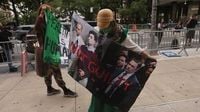Political violence in the United States has once again erupted into the national spotlight, with recent months marked by a series of high-profile attacks and assassination attempts that have left the nation both shocked and deeply divided. The murder of far-right commentator Charlie Kirk on September 10, 2025, during a student Q&A event attended by thousands, is only the latest and most visible example in a disturbing wave that has prompted renewed calls for unity and civility from lawmakers and activists across the political spectrum.
On September 23, 2025, the bipartisan Problem Solvers Caucus, led by Co-Chairs Representatives Brian Fitzpatrick (PA-01) and Tom Suozzi (NY-03), released an open letter signed by 36 members. The letter called for an end to political violence and the reckless rhetoric that so often fuels it. According to the Caucus, Americans must be able to express their beliefs without fear, and both leaders and citizens must raise the standard for political discourse. "We must all learn to disagree better," said Congressman Suozzi, emphasizing the need for robust debate without contempt or dehumanizing language.
Representative Fitzpatrick added, "Violence and intimidation have no place in our country. Not now. Not ever. What this moment demands from us all is that we speak with respect, listen with compassion, and remember that unity doesn’t require uniformity—only a shared commitment to the ideals that make us Americans." The letter, supported by organizations like Braver Angels, The Dignity Index, the National Institute of Civil Discourse, and BridgeUSA, condemned violence against political figures of all affiliations, listing recent victims including Charlie Kirk, Minnesota Speaker Emerita Melissa Hortman and her husband Mark, Minnesota Senator John Hoffman and his wife Yvette, Paul Pelosi, Representative Steve Scalise, Representative Gabby Giffords, Pennsylvania Governor Josh Shapiro, and President Donald Trump.
The call for unity comes amid a climate that has, in many ways, not been seen since the turbulent 1960s. According to BBC and other major outlets, the country is experiencing a level of political violence reminiscent of the era that claimed President John F. Kennedy, Martin Luther King Jr., and Robert F. Kennedy. Today’s violence, however, unfolds against a background of relentless polarization and mutual suspicion. The blame game between left and right is as heated as ever, but the reality is often more complicated: perpetrators are frequently disturbed individuals with no coherent ideology.
The assassination of Charlie Kirk, founder of Turning Point Action and a prominent ultraconservative youth leader, has become a flashpoint. Kirk, who rose to prominence by founding the organization in 2012 and raising up to $10 million annually, was known for his polemical style and unwavering support for Donald Trump. He relished debating liberals on college campuses, often using tactics that critics described as trolling or provocative. His rhetoric, which included comparing abortion to the Holocaust and embracing the "Great Replacement" conspiracy theory, made him a hero to some and an object of hatred to others.
Kirk’s murder occurred as he answered questions at a university event. A student named Hunter had just asked about mass shootings when a gunshot rang out, and Kirk collapsed, mortally wounded. The suspect, Tyler Robinson, 24, was apprehended after a two-day manhunt. His motives remain unclear; police found cryptic engravings on his bullet casings, referencing sexual memes, the protest song "Bella ciao," and vague anti-fascist slogans. According to reports, Robinson was registered as unaffiliated and had not participated in recent elections, underscoring the difficulty in assigning a clear ideological motive to the attack.
The Kirk assassination is only one in a string of attacks. In July 2024, Donald Trump narrowly survived an assassination attempt when a bullet grazed his ear. The following month, another attempt was made on Trump’s life in Florida. In December 2024, Luigi Mangione killed UnitedHealthcare executive Brian Thompson, a crime some interpreted as ultra-left terrorism, though Mangione’s motivations were also linked to his personal grievances with the company. April 2025 saw arsonists set fire to the home of Democratic Governor Josh Shapiro, and in June, Minnesota legislator Melissa Hortman and her husband were killed in armed attacks. These events have left Americans with a sense that the country is spinning out of control.
Historical context only deepens the sense of crisis. Four U.S. presidents have been assassinated, and two others narrowly escaped similar fates. In the modern era, plots against sitting presidents are uncovered almost yearly. Yet the current wave of high-profile murders and attempted assassinations is, by many measures, unprecedented since the 1960s. According to The Violence Project, assassination attempts on political figures from 2021 to 2025 reached levels not seen in decades. However, broader analyses from the University of Cincinnati’s Prosecution Project and Princeton University’s Bridging Divides Initiative suggest that while high-profile attacks have increased, threats and harassment have remained steady or even declined slightly in 2025.
Still, statistics fail to capture the shock and fear these crimes generate. The opaque motives of attackers make every incident a battleground for partisan recriminations. After Kirk’s killing, President Trump called Kirk "a martyr for truth and freedom" and blamed “radical leftists” for demonizing Kirk and inciting violence. "This kind of rhetoric is directly responsible for the terrorism we are witnessing in our country today, and it must stop immediately," Trump declared, vowing to prosecute organizations that "fund and support" such views.
Democrats, for their part, pointed to data indicating that 76 percent of extremist killings are committed by far-right extremists, compared to four percent by far-left extremists—a statistic cited by Congressman Seth Moulton and drawn from the Anti-Defamation League and Princeton’s Prosecution Project. Moulton stated, "Let’s take a hard look at where this violence is really coming from. I condemn that four percent, but as a country we must be honest about the true source of this violence."
Yet the issue is not simply about which side carries out more attacks, but about how violence and assassination are normalized in the public discourse. Social media immediately recalled Kirk’s own controversial statement: "the death of a certain number of people each year is justified if that is the price of preserving the Second Amendment." Trump himself has long been criticized for normalizing violent and hateful rhetoric, a trend that many argue contributed to events like the storming of the Capitol and the broader radicalization of American society.
Despite the overwhelming majority of Americans condemning political violence—YouGov polling found 87 percent view it as a serious problem—a significant minority still view it as justifiable under certain circumstances. A States United Action poll found that 37 percent said violence could be justified “always” or “often” if a gun ban were enacted, while one-third said it could be justified if the government imprisoned citizens for criticizing authorities.
The aftermath of Kirk’s assassination has seen consequences beyond the courtroom. Right-wing supporters launched a campaign to identify and penalize those who posted critical comments about Kirk, resulting in dismissals of teachers and professors. ABC suspended late-night host Jimmy Kimmel for remarks about the uncertain political views of Kirk’s killer, with the Federal Communications Commission backing the move. Though Kimmel’s suspension was lifted on September 23, the incident has raised concerns about political influence over media and the possibility of broader crackdowns on dissent.
As America grapples with this new era of political violence, the urgent question remains: can the nation find a way to disagree better, as the Problem Solvers Caucus urges, or will the cycle of blame and retaliation continue to escalate? For now, the country stands at a crossroads, with the ideals of free speech, safety, and civil discourse hanging in the balance.



